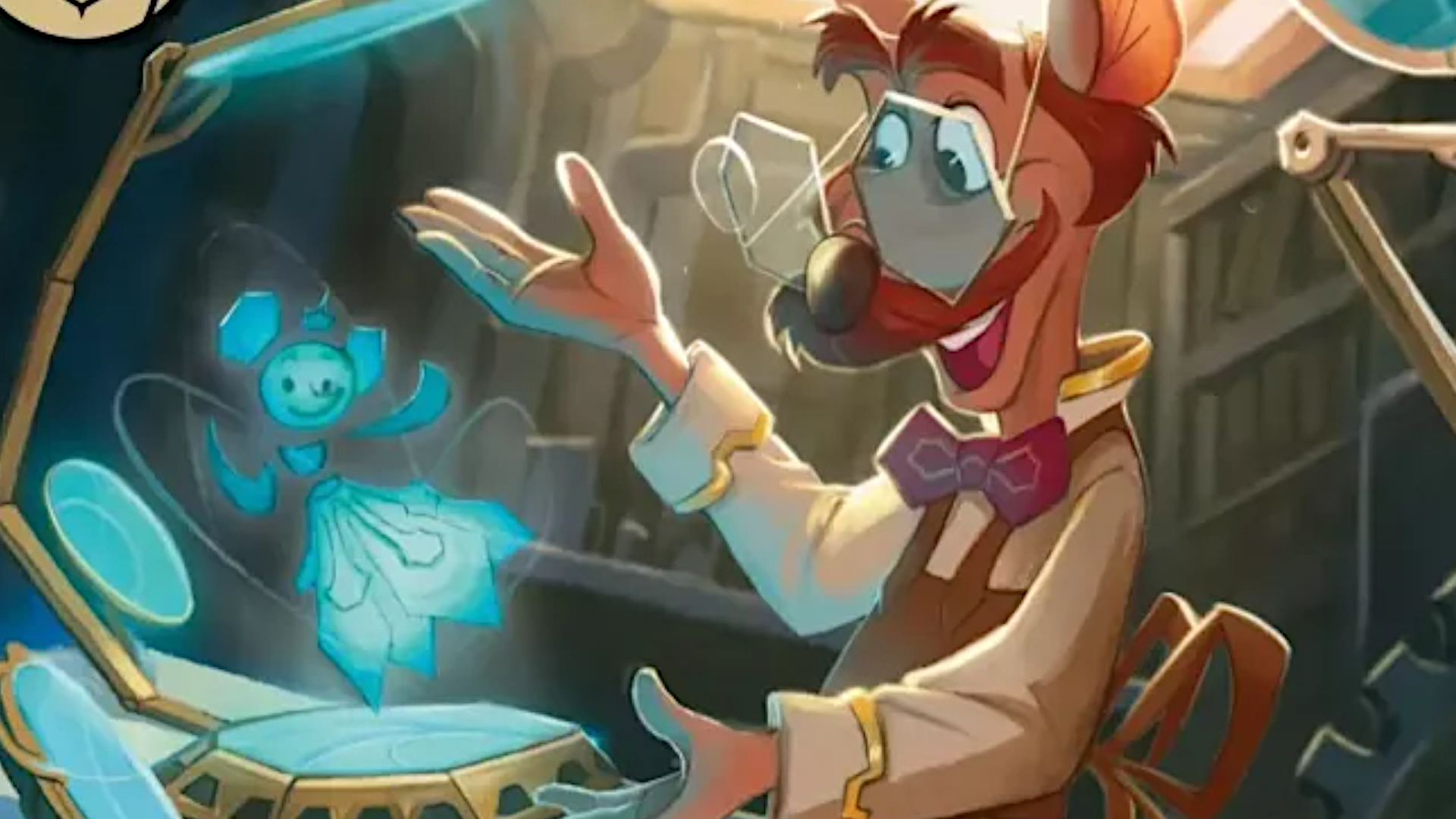Thanks to the meta, one of the most busted cards in TCG Disney Lorcana is Hiram Flaversham—and if you have no idea who that is, you're in good company
Toy with your enemies.

Disney Lorcana's sure been interesting to follow. Aside from the big, dramatic lawsuit where the words "the legal equivalent of alchemy" were used in a courtroom, it's also picked up some pretty good steam as a competitive card game.
Which shouldn't be a surprise, really: When you see an Elsa card going up on eBay for $7,000, things start to click into place. Disney's branding is potent, and from what I've heard, Ravensburger has put together a fun TCG to back the mouse up. It's honestly surprising that Disney's own-brand Magic: The Gathering didn't happen sooner.
And yet all that branding, all those highly marketable characters, even the pristine copyright-extending might of Mickey himself are powerless before the unstoppable force of the metagame, which has placed one of the least iconic Disney characters of all time into a position of godhood.
As spotted by TheGamer: Hiram Flaversham, Toymaker (which honestly sounds like the name of a Dark Souls Boss) is making waves, despite his humble origins. He's an inventor from The Great Mouse Detective—the only movie he stars in—who is kidnapped by Professor Ratigan to help him with his evil plans in a sort of Tony Stark situation. It's hard to be a genius.
I don't know that much about Lorcana specifically, but even I can see how Hiram is busted. He has an ability that allows you to banish an item to draw two cards. There's an item card, Pawpsicle, that's pretty low-cost, and also happens to let you draw a card when played. Nick Wild—yes, the fox from Zootopia—also plays a key part of the puzzle, since he can get that Pawpsicle card back into play after it's been banished.
So the combo goes like this: Play Pawpsicle, banish it with Hiram. That's three cards drawn. The next turn, you play Nick, get the Pawpsicle back, then banish it with Hiram again. That's another three cards, or six cards in two turns for very little effort.
If you're not familiar with TCGs, you might be thinking 'Oh, so it just draws you cards?' If you are familiar with TCGs, you're probably drooling. That's because card draw in basically any card-based game is always strong, especially in games like Lorcana where there's no maximum hand size.
Keep up to date with the most important stories and the best deals, as picked by the PC Gamer team.
Why is filling up your hand so beneficial? Card advantage. To put it simply, the more cards you have, the better your card advantage is, because you have more options to deal with whatever your opponent's doing. That means you can spend your turns more efficiently, avoiding suboptimal plays and dead spots in your strategy.
Spending too much time drawing cards can give you a whole other set of problems, sacrificing tempo. Tempo just means keeping a good handle on the pace of the game, controlling the board and making every turn count. If your opponent's been making big plays for three turns, and you've just been sitting there growing your hand, you're still seriously on the backfoot.
That's why anything that gets you a lot of cards without much effort (like the humble Hiram) will dominate. And Lorcana's community agrees—last week, Wargamer observed a spike of 800% sales of the humble mouse inventor, despite the fact that the little guy is pretty cheap. He's out of stock in a lot of places, but he's also not going for much more than $10 on eBay at the time of writing. For now, anyway—Elsa better watch her back.
Even the Disney fandom bows before the metagame. You can put the shiniest faces on the shiniest cards, but if a one-time character from a film in the '80s waltzes in with great draw, players will make him their new king.

Harvey's history with games started when he first begged his parents for a World of Warcraft subscription aged 12, though he's since been cursed with Final Fantasy 14-brain and a huge crush on G'raha Tia. He made his start as a freelancer, writing for websites like Techradar, The Escapist, Dicebreaker, The Gamer, Into the Spine—and of course, PC Gamer. He'll sink his teeth into anything that looks interesting, though he has a soft spot for RPGs, soulslikes, roguelikes, deckbuilders, MMOs, and weird indie titles. He also plays a shelf load of TTRPGs in his offline time. Don't ask him what his favourite system is, he has too many.

